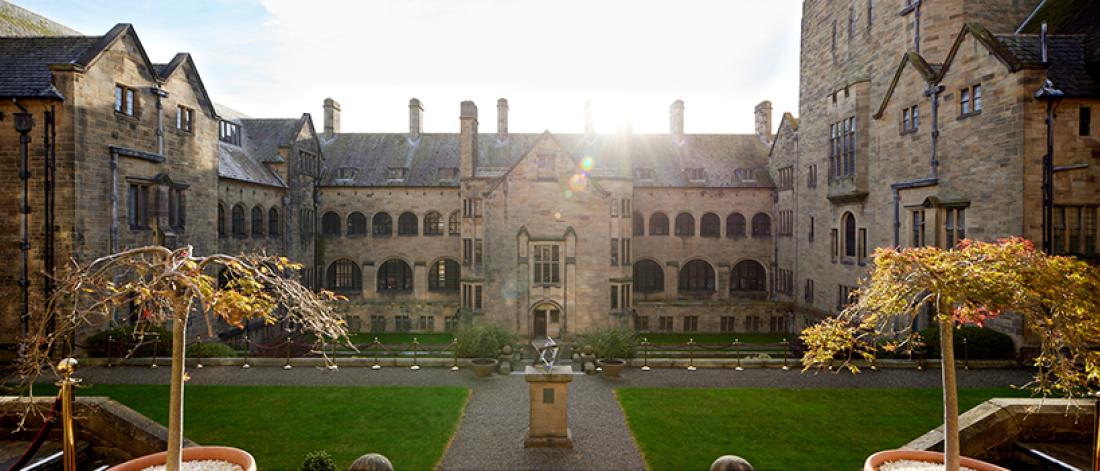About This Course
This course allows you to specialise in an important area of legal practice, giving you a deeper understanding of crime, criminal law and the criminal justice system. As well as developing your legal skills, our strong links with the legal profession and industry ensure practical opportunities for ‘real world’ experiences. If you are passionate about criminal justice, this well-rounded degree is the perfect springboard to launch you into your chosen career.
The course is designed to foster your intellectual independence. You’ll be supported to develop the confidence and skills needed to think critically, to ask and answer cogent questions about law and its role in society, and to effectively communicate your reasoned arguments, orally or in writing.
You will acquire new knowledge and understanding of the principles and values of law and justice, and you’ll learn how law can be used to benefit individuals and societies, including the most marginalised in our community.
During the course you will study fundamental areas of legal knowledge. Not only will you study Criminal Law, but you will also examine subjects such as Public Law where you’ll learn about how the country is organised and run; and Contract Law where you’ll learn about how legal agreements are made and operate between people and companies. Additionally, you will have the opportunity to study topics such as Digital Policing and E-Crime, Crime and the Media and Organised Crime and Counterterrorism.
You’ll also have the opportunity to choose from exciting law optional modules such as International Law, Commercial Law, Human Rights, Philosophy of Law and Family Law. If you choose our Work Placement module you will get the opportunity to experience legal work in a real-life situation.
You will be an active participant in your learning. It’s not all about sitting and reading. You'll learn the skills of debating, advocating and negotiating through a range of module and extra-curricular opportunities. You’ll also benefit from professional development activities, trips to government and judicial institutions, and from a wide range of guest speakers.
Throughout your studies you’ll acquire the academic knowledge and be introduced to the skills required to pursue a legal career should you wish to go on to qualify as a solicitor or barrister.
Why choose Bangor University for this course?
- Unique opportunities to work with legal practitioners and industry professionals through our pro bono programmes.
- A state-of-the-art replica courtroom, ensuring students gain essential practical experience by taking part in mock legal trials.
- Welsh language provision is offered as part of every compulsory law module, and some optional modules can be studied entirely through the medium of Welsh.
Additional Course Options
This course is available with a Placement Year option where you will study for 1 additional year. The Placement Year is undertaken at the end of the second year and students are away for the whole of the academic year.
The Placement Year provides you with a fantastic opportunity to broaden your horizons and develop valuable skills and contacts through working with a self-sourced organisation relevant to your degree subject. The minimum period in placement (at one or more locations) is seven calendar months; more usually you would spend 10-12 months with a placement provider. You would normally start sometime in the period June to September of your second year and finish between June and September the following year. Placements can be UK-based or overseas and you will work with staff to plan and finalise the placement arrangements.
You will be expected to find and arrange a suitable placement to complement your degree and will be fully supported throughout by a dedicated member of staff at your academic School and the University’s Careers and Employability Services.
You will have the opportunity to fully consider this option when you have started your course at Bangor and can make an application for a transfer onto this pathway at the appropriate time. Read more about the work experience opportunities that may be available to you or, if you have any questions, please get in touch.
This course is available with an International Experience Year option where you will study or work abroad for 1 additional year. You will have ‘with International Experience’ added to your degree title on graduating.
Studying abroad is a great opportunity to see a different way of life, learn about new cultures and broaden your horizons. With international experience of this kind, you’ll really improve your career prospects. There are a wide variety of destinations and partner universities to choose from. If you plan to study in a country where English is not spoken natively, there may be language courses available for you at Bangor and in your host university to improve your language skills.
You will have the opportunity to fully consider this option at any time during your degree at Bangor and make your application. If you have any questions in the meantime, please get in touch.
Read more about the International Experience Year programme and see the studying or working abroad options on the Student Exchanges section of our website.
Course Content
You will experience a range of teaching methods throughout your course, including lectures, small group formats (tutorials), online learning environments, self-directed or collaborative study, experiential learning and problem-based learning.
Your usual week will be made up of twelve hours of lectures along with fortnightly one-hour tutorials.
During your time with us, you will foster self-management skills, including an ability to reflect on your own learning, make effective use of feedback and an ability to work in a team.
You will develop the ability to conduct independent research, including accurate identification of issues which require researching, retrieval and critical evaluation of relevant information from a range of appropriate sources, including primary legal sources.
The level of challenge and achievement you will be faced with is gradually increased throughout your course.
Our learning, teaching and assessment procedures will give you the opportunity to demonstrate that you have met the necessary skills and qualities within your law course. We recognise the importance of inclusive practice and are sensitive to equal opportunities requirements as indicated by good practice and relevant legislative obligations.
A wide range of assessment methods are used to determine your overall achievement; these assessments may be timed or untimed, seen or unseen, continuous or examination based.
Tasks that you might encounter could include essays and reports of varying length; case notes; statutory interpretation; briefs; critiques of articles; oral/video presentations; moots; skills-based assessments; reflective learning journals; research project/dissertation; and work/clinic-based assessments.
What will you study on this course?
In Year 1, students will take 100 credits from the following topics, Contract Law, Criminal Law, Legal Skills, Public Law, Introduction to Criminal Justice and Introduction to Criminology. There are also optional modules available in topics such as Applying psychological theory to real-world problems, Criminal Psychology and Social Influence.
In Year 2, students will take 100 credits from the following topics, Criminal Evidence, Equity and Trusts, Land Law, Law, Justice and Procedure and Tort Law. There are also optional modules available in topics such as Crime & the Media and Digital Policing and E-Crime.
In Year 3, students will take 20 credits from the following topics The UK, EU Law and Brexit. Students will also take 40 credits from the topics such as, Forensic Psychology, Organised Crime and Counter-terrorism, Perspectives on Youth Crime, Policing, Security & The State, Power, Crime and Punishment and Serial Killers. Students will also take 60 credits from topics such as, Legal Advice Clinic, Business Law & Practice, Commercial Law, Criminal Law Dissertation, Environmental Law, Family and Welfare Law, Intellectual Property Law, International Law and Contemporary Issues, International Law of the Sea, Law and Technology, Law, Justice and Rights, Partnerships and Company Law, Practical Professional Skills, Property Practice, Wills & Estates and Work Placement.
Please note course content is for guidance purposes only and may be subject to change.
Facilities
Law facilities
- We have our own Law library, situated in the beautiful Lloyd Reading Room in the Main Arts library, which has received substantial investment from the University and other benefactors.
- The Law Library provides printed and electronic sources to meet the needs of its users and is constantly developed to reflect the latest teaching and research activities within the field of Law. These resources include reference, statutes, law reports, journals, textbooks, pamphlets, governmental reports, newspapers and online legal databases.
- For those wishing to undertake more in-depth research at Masters or PhD level, the University Archives contain a wealth of historical material and a rich vein of primary sources.
- A purpose-built moot court room which enables students to gain practical experience. The Moot Court Room allows ours students to practice presenting cases in a real life setting, take part in trials, act as representatives for the parties and learn how to conduct themselves in a court of law.
General University Facilities
Library and Archive Services
Our four libraries provide a range of attractive study environments including collaborative work areas, meeting rooms and silent study spaces.
We have an extensive collection of books and journals and many of the journals are available online in full-text format.
We house one of the largest university-based archives not only in Wales, but also the UK. Allied to the Archives is the Special Collections of rare printed books.
Learning Resources
There is a range of learning resources available, supported by experienced staff, to help you in your studies.
The University’s IT Services provides computing, media and reprographics facilities and services including:
- Over 1,150 computers for students, with some PC rooms open 24 hours a day
- Blackboard, a commercial Virtual Learning Environment, that makes learning materials available on-line.
Course Costs
General University Costs
Home (UK) students
- The cost of a full-time undergraduate course is £9,250 per year (2025/26).
- The fee for all integrated study abroad years is £1,385 (2025/26).
- The fee for an integrated year in industry as part of a sandwich programme is £1,850 (2025/26).
More information on fees and finance for Home (UK) students.
International (including EU) students
Additional Costs
There are also some common additional costs that are likely to arise for students on all courses, for example:
- If you choose to study abroad or take the International Experience Year as part of your course.
- If you attend your Graduation Ceremony, there will be a cost for gown hire (£25-£75) and cost for additional guest tickets (c.£12 each).
Course-specific additional costs
Depending on the course you are studying, there may be additional course-specific costs that you will be required to meet. These fall into three categories:
- Mandatory Costs: these are related to a particular core or compulsory module that you’ll be required to complete to achieve your qualification e.g. compulsory field trips, uniforms for students on placement, DBS Check.
- Necessarily Incurred Costs: these may not be experienced by all students, and will vary depending on the course e.g. professional body membership, travel to placements, specialist software, personal safety equipment.
- Optional Costs: these depend on your choice of modules or activity and they are shown to give you an indication of the optional costs that may arise to make sure your choice is as informed as possible. These can include graduation events for your course, optional field trips, Welcome Week trips.
Entry Requirements
Offers are tariff based, 104 - 136 tariff points from a Level 3 qualification* e.g.:
- A Levels: General Studies and Key Skills not normally accepted
- BTEC National Extended Diploma: DMM - DDD
- Cambridge Technical Extended Diploma: DMM - DDD
- International Baccalaureate Diploma: accepted
- Access: pass required
- Welsh Baccalaureate: We will accept this qualification in conjunction with other level 3 qualifications
- T Levels: T Levels in a relevant subject considered on a case-by-case basis
- Extended Project Qualification: Points can include a relevant Extended Project (EPQ) but must include a minimum 2 full A-levels, or equivalent.
We are happy to accept combinations of the qualifications listed above, as well as alternative Level 3 qualifications such as City & Guilds, Access and Cambridge Technical Diplomas.
We also welcome applications from mature learners.
International Candidates: school leaving qualifications that are equivalent to A levels/Level 3 and/or college diplomas are accepted from countries worldwide (subject to minimum English Language requirements). More information can be found on our International pages.
*For a full list of accepted Level 3 qualifications, go to www.ucas.com.
Please note: Prospective students should be aware that if they wish to practice as a solicitor or barrister following their university studies, they would need to meet the requirements of the Solicitors Regulation Authority or the Bar Standards Board to become qualified. This would include meeting requirements in relation to criminal offences and behaviour. Prospective students with a criminal conviction are advised to contact the relevant professional body for advice.
Offers are tariff based, 120 - 144 tariff points from a Level 3 qualification* e.g.:
- A Levels: General Studies and Key Skills not normally accepted
- BTEC National Extended Diploma: DDM - DDD
- Cambridge Technical Extended Diploma: DDM - DDD
- International Baccalaureate Diploma: accepted
- Access: pass required
- Welsh Baccalaureate: We will accept this qualification in conjunction with other level 3 qualifications
- T Levels: T Levels in a relevant subject considered on a case-by-case basis
- Extended Project Qualification: Points can include a relevant Extended Project (EPQ) but must include a minimum 2 full A-levels, or equivalent.
We are happy to accept combinations of the qualifications listed above, as well as alternative Level 3 qualifications such as City & Guilds, Access and Cambridge Technical Diplomas.
We also welcome applications from mature learners.
International Candidates: school leaving qualifications that are equivalent to A levels/Level 3 and/or college diplomas are accepted from countries worldwide (subject to minimum English Language requirements). More information can be found on our International pages.
*For a full list of accepted Level 3 qualifications, go to www.ucas.com.
Please note: Prospective students should be aware that if they wish to practice as a solicitor or barrister following their university studies, they would need to meet the requirements of the Solicitors Regulation Authority or the Bar Standards Board to become qualified. This would include meeting requirements in relation to criminal offences and behaviour. Prospective students with a criminal conviction are advised to contact the relevant professional body for advice.
General University Requirements
To study for a degree, you’ll be asked for a minimum of UCAS Tariff points. For a fuller explanation of the UCAS Tariff Points, please see www.ucas.com.
We accept students with a wide range of qualifications and backgrounds and consider each application individually.
All students need to have good basic skills and the University also values IT and communication skills.
As part of the University’s policy, we consider applications from prospective disabled students on the same grounds as all other students.
We also consider applications from mature students who can demonstrate the motivation and commitment to study a university programme. Each year we enrol a significant number of mature students. For more information about studying as a mature student, see our Studying at Bangor section of the website.
EU and International Students' Entry Requirements
For detailed guidance on the entry requirements for EU and International Students, including the minimum English Language entry requirement, please visit the Entry Requirements by Country pages. International applicants can also visit the International Education Centre section of our website for further details.
Bangor University offers International Incorporated Bachelor Degrees for International students whose High School qualification is not equivalent to the UK school leaving qualification. The first year (or Year 0) is studied at Bangor University International College, an embedded College on our University campus and delivered by Oxford International Education Group.
Careers
A Bangor Law degree opens up exciting career paths in law and in many other rewarding areas where you can make a difference to people's lives and the planet.
Throughout your studies you’ll acquire the academic knowledge and be introduced to the skills needed to pursue a legal career should you wish to go on to qualify as a solicitor or barrister. You may wish to work in the public sector as a government lawyer, or in the private sector, specialising in criminal law, commercial law or immigration law.
If you don’t want to practise as a solicitor or barrister, you may still wish to work in an area where your legal training and knowledge would be advantageous and where you can work to make a positive difference. Many non-governmental organisations (charities) require people with legal backgrounds to work as policy officers, campaigners and advice workers. International organisations, such as the United Nations offer tremendous opportunities to those who are looking for an international career.
As an LLB Law graduate, you will be able to pursue career opportunities in a wide range of other areas not necessarily connected to the law but for which the general and intellectual skills acquired during a law degree make you extremely well qualified. These may include the civil service, journalism, the media and creative industries, the probation service, the police and the prison service.
At Bangor we work hard to ensure you become aware of the many opportunities that lie ahead.
- The University’s Skills and Employability Service provide you with essential information to allow you to make key decisions about your future.
- The School’s Employability Officer works to assist students in finding work experience, including internships and placements.
- If you take the Work Placement module, you will have the chance to experience legal work in a real-life situation.
- The Student Volunteering Office offers many opportunities to work with the local community.
Opportunities at Bangor
The University’s Careers and Employability Service provides a wide range of resources to help you achieve your graduate ambitions.
Internships
Bangor University runs a paid internship scheme within the university’s academic and service departments.
Student Volunteering
Volunteering widens your experience and improves your employability. Find out more about volunteering on the Students’ Union’s website.
Foundation Year
A 'with Foundation Year' option is available for this course. Apply for Law (with Foundation Year).
What is a Foundation Year course?
If you don’t have the required qualifications for the degree-level course or are looking to re-enter education after time away from study, then a Foundation Year Programme might be the right choice for you.
The Foundation Year is an excellent introduction to studying this subject at university and will provide you with the knowledge, skills and confidence required to go on to study this course at degree-level.
When you have successfully completed the Foundation Year, you can progress on to the first year of this degree-level course.






